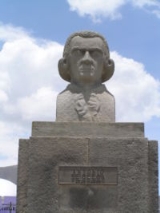
Antonio de Ulloa
Encyclopedia
Antonio de Ulloa y de la Torre-Girault (12 January 1716 – 3 July 1795) was a Spanish general, explorer, author, astronomer
, colonial administrator and the first Spanish governor of Louisiana.
Rebellion of 1768]].
For the remainder of his life, he served as a naval officer. In 1779 he became lieutenant-general of the naval forces. Ulloa died at Isla de Leon, Cádiz
, in 1795.
, 1784) Relación histórica del viaje á la América Meridional, which contains a full, accurate, and clear description of the greater part of South America geographically, and of its inhabitants and natural history. In collaboration with the Jorge Juan mentioned above, he also wrote Noticias secretas de América, giving valuable information regarding the early religious orders in Spanish America. This work was published by David Barry
in London, 1826.
His name is also recalled as the meteorological term Ulloa's halo (also known as Bouguer's halo), which an observer may see infrequently in fog
when sun breaks through (for example, on a mountain) — effectively a "fog-bow" (as opposed to a "rain-bow"). A fog-bow is defined as "an infrequently observed meteorological phenomenon; a faint white, circular arc or complete ring of light that has a radius of 39 degrees and is centered on the antisolar point. When observed, it is usually in the form of a separate outer ring around an anticorona." (Tricker, R. A. R., 1970: An Introduction to Meteorological Optics, pages 192–193).
Astronomer
An astronomer is a scientist who studies celestial bodies such as planets, stars and galaxies.Historically, astronomy was more concerned with the classification and description of phenomena in the sky, while astrophysics attempted to explain these phenomena and the differences between them using...
, colonial administrator and the first Spanish governor of Louisiana.
Rebellion of 1768]].
For the remainder of his life, he served as a naval officer. In 1779 he became lieutenant-general of the naval forces. Ulloa died at Isla de Leon, Cádiz
Cádiz (province)
Cádiz is a province of southern Spain, in the southwestern part of the autonomous community of Andalusia, the southernmost part of continental Western Europe....
, in 1795.
Legacy
As a result of his scientific work in Peru, he published (MadridMadrid
Madrid is the capital and largest city of Spain. The population of the city is roughly 3.3 million and the entire population of the Madrid metropolitan area is calculated to be 6.271 million. It is the third largest city in the European Union, after London and Berlin, and its metropolitan...
, 1784) Relación histórica del viaje á la América Meridional, which contains a full, accurate, and clear description of the greater part of South America geographically, and of its inhabitants and natural history. In collaboration with the Jorge Juan mentioned above, he also wrote Noticias secretas de América, giving valuable information regarding the early religious orders in Spanish America. This work was published by David Barry
David Barry
David Barry is a Welsh actor. He is best known for his role as Frankie Abott, , in the LWT sitcom Please Sir! and the spin-off series The Fenn Street Gang,...
in London, 1826.
His name is also recalled as the meteorological term Ulloa's halo (also known as Bouguer's halo), which an observer may see infrequently in fog
Fog
Fog is a collection of water droplets or ice crystals suspended in the air at or near the Earth's surface. While fog is a type of stratus cloud, the term "fog" is typically distinguished from the more generic term "cloud" in that fog is low-lying, and the moisture in the fog is often generated...
when sun breaks through (for example, on a mountain) — effectively a "fog-bow" (as opposed to a "rain-bow"). A fog-bow is defined as "an infrequently observed meteorological phenomenon; a faint white, circular arc or complete ring of light that has a radius of 39 degrees and is centered on the antisolar point. When observed, it is usually in the form of a separate outer ring around an anticorona." (Tricker, R. A. R., 1970: An Introduction to Meteorological Optics, pages 192–193).

